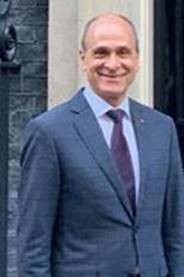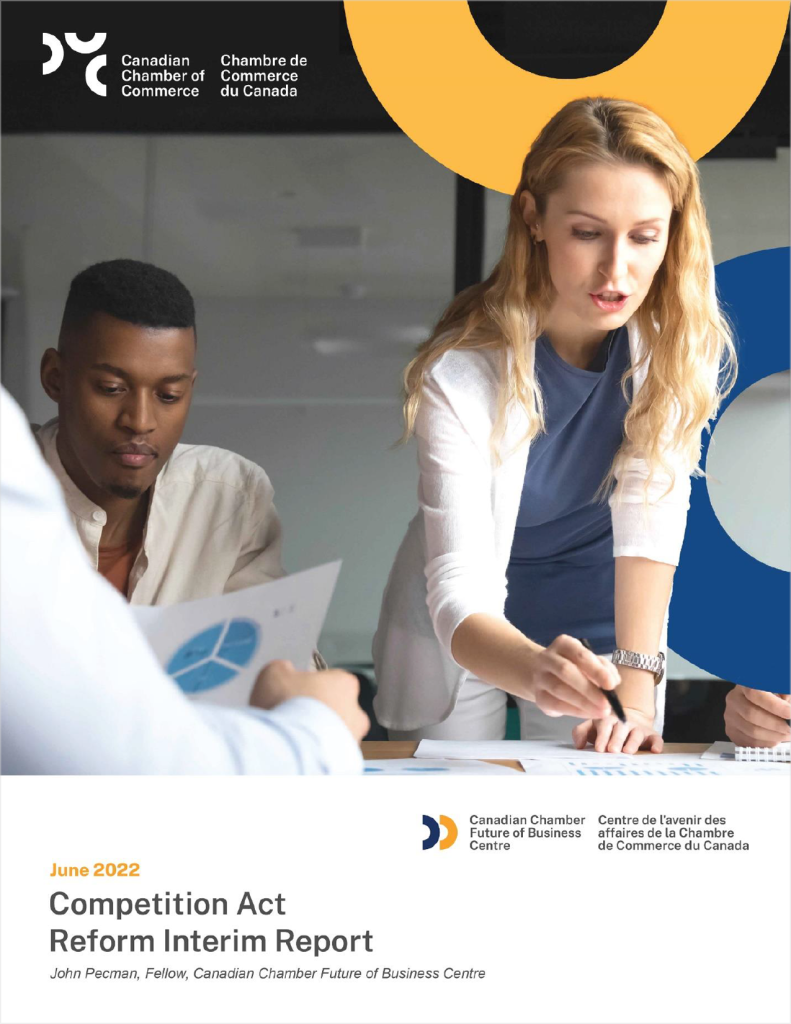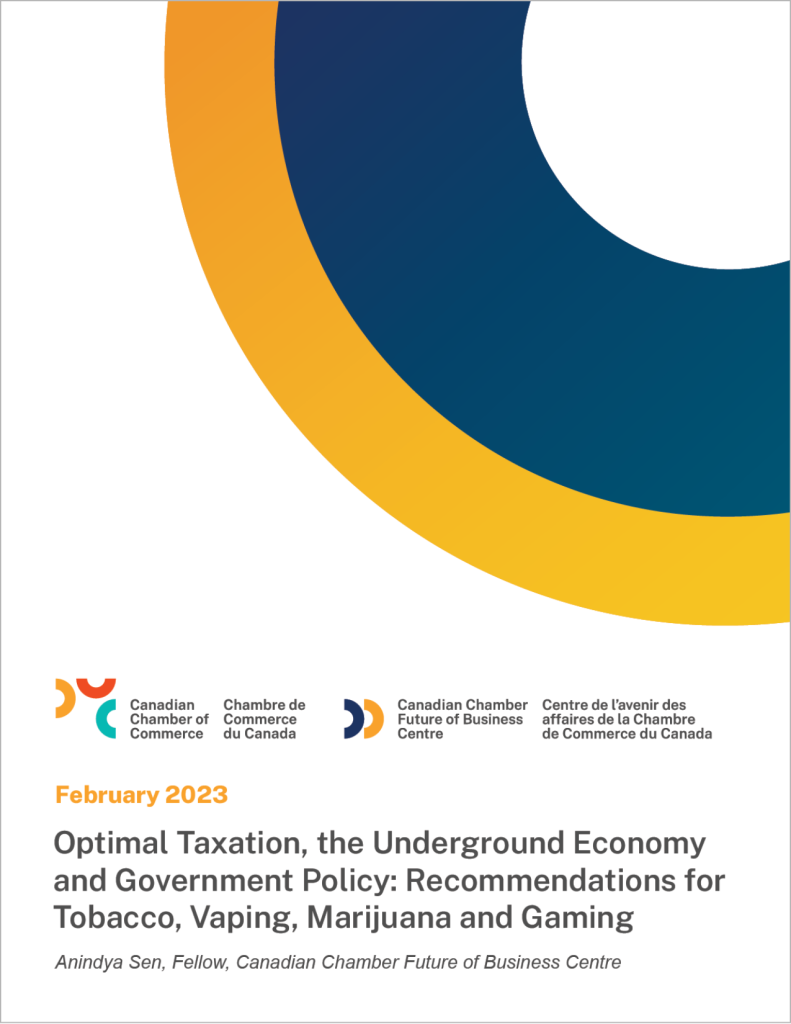
The Canadian Chamber of Commerce is committed to enabling the future of business success. To advance progress on forward-looking public policy issues, the Canadian Chamber Future of Business Centre is our platform for placing these topics into the public debate.
To drive forward the work of the Canadian Chamber Future of Business Centre, we are engaging external Fellows to complement the insights of our members. The reports authored by our Fellows, and with the added insights of our Advisory Councils, will be the foundation of the Centre’s work.
The Centre’s reports are produced by the external Fellows at arm’s length, separately from the Canadian Chamber’s consensus-based policy committee process. The views expressed in the reports are those of the Fellows.
Canada and Global Energy Security
In many ways, Canada is an energy superpower. It has abundant supplies of natural gas, oil, hydro, nuclear power, renewables, and critical minerals, but over the past two decades it has vigorously debated what to do with these resources. In this report, Fellow Eric Miller argues that of all the established energy options, natural gas is by far the cleanest, emitting half the carbon into the atmosphere as coal. Natural gas also fundamentally enables energy systems that include significant volumes of renewables. Further, Canada’s ability to export more LNG would both support the Canadian economy and meaningfully lower global carbon emissions.
Reports
About the Fellow

Eric Miller, Fellow, Canadian Chamber Future of Business Centre
Eric Miller is President of Rideau Potomac Strategy Group, a consultancy that advises private and public sector clients on trade and business matters. Mr. Miller works with clients on trade and economic policy challenges, market development, resolving supply chain and regulatory issues, improving their government relations, understanding technology trends and navigating geopolitical developments. Mr. Miller presently serves on the external advisory committee on international trade policy to Canada’s Deputy Minister of International Trade. He also served for three years as Senior Advisor to the Global Alliance for Trade Facilitation and led the development and implementation of Alliance projects in South and Southeast Asia, including Vietnam, India and Sri Lanka.
He previously served as Vice President for North America and Cybersecurity at the Business Council of Canada, which represents the CEOs of the 150 largest companies in the country. Before joining the Council in 2013, Mr. Miller represented Canada’s Department of Industry at the Canadian Embassy in Washington, DC.
Mr. Miller has extensive international experience, having advised more than 40 governments in Asia, Latin America, and the Caribbean on trade, transportation and economic policies. Over the course of his career, he has worked on the development of six free trade agreements. He is a Global Fellow at the Woodrow Wilson Center in Washington and a Fellow with the Canadian Global Affairs Institute in Ottawa. He has been published in and/or interviewed by an array of leading news outlets, including the Wall Street Journal, Financial Times, BBC News, The Guardian, Bloomberg and The Globe and Mail.
The Future of Competition Policy
As policymakers globally explore reforms to their competition policy rules to respond to the increasing amounts of economic and consumer activity occurring in digital formats, there will be an upcoming review and likely changes to the Competition Act in Canada. This Canadian Chamber Future of Business Centre project will outline the competition policy our country needs to support economic growth. The Fellow for the competition project is John Pecman.
Reports
About Our Fellow

John Pecman, Fellow, Canadian Chamber Future of Business Centre
John is an economist with an MA from McMaster University and has worked at the Competition Bureau as an investigator, manager and executive for more than 34 years. He worked in every enforcement branch at the Bureau and held increasingly senior positions since first joining the organization in 1984. John served from June 2013 as the Commissioner of Competition of the Competition Bureau Canada for a five-year term. Under John’s leadership, the Bureau’s enforcement actions preserved competition and drove innovation in a variety of major areas of the Canadian economy, including the automotive, manufacturing, ecommerce, telecommunications and retail sectors. John was responsible for reinvigorating the Bureau’s role in advocating for Canadians by promoting the benefits of increased competition in regulated sectors of the economy. John’s philosophy of a more open, transparent and collaborative Bureau led to many initiatives including a realignment of the organization, prioritization of corporate compliance programs and building many trust relationships with domestic and international partners. John held executive positions with the OECD Competition Committee and the International Competition Network (ICN) and also served as ICN/OECD Liaison to ensure coordination of work by these international bodies. Presently John holds a number of appointments, including as a Non-Government Advisor (NGA) to the ICN, Senior Fellow at the C.D. Howe Institute, Vice-Chair of the U.S. Comments and Policy Committee at the American Bar Association Antitrust Section, as well as the TMX Industry Professor at DeGroote Business School at McMaster University. John is also a Senior Business Advisor in the competition, marketing and foreign investment group at Fasken.
Meet Our Advisory Council
Pinar Akman
Professor Dr. Pınar Akman is a Professor of Law specialising in competition law at the University of Leeds, where she is also a Director at the Jean Monnet Centre of Excellence on Digital Governance. She has published widely in the area of competition law and economics, particularly on abuse of dominance, vertical restraints, and competition in digital markets. Her publications include the sell-out monograph The Concept of Abuse in EU Competition Law: Law and Economics Approaches alongside numerous peer-reviewed publications. She received a Philip Leverhulme Prize (Leverhulme Trust) for her research into competition law in the digital economy. She has presented her research in over 20 countries around the world and advised and/or provided expertise to numerous organisations including the IMF, European Parliament, House of Lords, Federal Trade Commission and World Economic Forum. Amongst others, she sits on the Scientific Committee of the Florence Competition Programme (European University Institute), the Advisory Board of Computational Antitrust at CodeX (Stanford) and the Editorial Board of World Competition. She is a Non-Governmental Advisor appointed by the United Kingdom and by Turkey at the International Competition Network.
Anita Banicevic
Anita Banicevic is a partner in the Competition & Foreign Investment Review practice. She advises domestic and international clients on many aspects of Canadian competition and foreign investment review law, including mergers, criminal and civil investigations, misleading advertising and other pricing, distribution and general compliance matters. Anita has experience advising clients in a wide variety of industries, including airlines, building materials, consumer products, financial institutions, natural resources, pharmaceuticals, real estate, retail and transportation. She has obtained Competition Act and Investment Canada Act clearance for numerous transactions involving domestic and international businesses. Anita has also represented clients in a number of abuse of dominance and criminal price-fixing investigations by the Competition Bureau. She has experience with contested proceedings, negotiated resolutions, and where available, immunity or leniency agreements. Anita is currently an executive member of the National Competition Law Section of the Canadian Bar Association (CBA), co-chair of the Compliance and Ethics Antitrust Law Section of the American Bar Association and was formerly the chair of the CBA’s fall conference on Competition Law. She is also a non-governmental adviser to the International Competition Network, an organization of international competition law authorities devoted to improving worldwide cooperation and convergence.
Hilary Jennings
Hilary Jennings is an independent competition and regulation consultant and Board Member of the UK Regulatory Policy Committee. Her core work is in providing best practice advice to competition authorities and government departments on competition, regulatory and market access policies in the UK, EU and emerging economy markets, and working with organisations such as the OECD, the World Bank and the European Commission. She is also the Special Adviser on Competition for the EU-Asia Competition Cooperation Project for DG Competition with ASEAN, China, India, Japan and Korea and the Course Director for DG Competition’s new Africa-EU Competition Cooperation project. She previously held senior roles at the OECD and the UK’s Office of Fair Trading, as well as in the private sector. She has a LL.M in EU Competition Law and International Trade Law from King’s College London.
Paul Johnson
Paul A. Johnson, PhD has over 20 years of experience in competition economics. Dr. Johnson’s experience spans a wide range of industries and all areas of competition economics including mergers and acquisitions, monopolistic practices, cartels, deceptive marketing practices, class certification, and calculation of damages. He is currently the owner of Rideau Economics, located in Ottawa.
From 2016-2019, Dr. Johnson served a three-year tenure as the chief economist at the Competition Bureau where he worked with case teams, worked on special projects, directly engaged with stakeholders, and advised the Commissioner of Competition on all significant antitrust matters. He was a principal contributor to the Bureau’s outreach efforts on emerging competition issues related to big data. Prior to opening Rideau Economics, Dr. Johnson was a Partner in the antitrust practice at Bates White Economic Consulting in Washington, DC. At Bates White, he worked on civil antitrust litigation and on high-profile mergers before US and European antitrust agencies in a wide range of industries. Dr. Johnson has a PhD in economics from Université de Montréal and a BA in economics from the University of North Carolina. He is bilingual in French and English and can provide consulting services in either language.
Eric Miller
Eric Miller is President of Rideau Potomac Strategy Group, a consultancy that advises private and public sector clients on trade and business matters. Mr. Miller works with clients on trade and economic policy challenges, market development, resolving supply chain and regulatory issues, improving their government relations, understanding technology trends and navigating geopolitical developments. Mr. Miller presently serves on the external advisory committee on international trade policy to Canada’s Deputy Minister of International Trade. He also served for three years as Senior Advisor to the Global Alliance for Trade Facilitation and led the development and implementation of Alliance projects in South and Southeast Asia, including Vietnam, India and Sri Lanka.
He previously served as Vice President for North America and Cybersecurity at the Business Council of Canada, which represents the CEOs of the 150 largest companies in the country. Before joining the Council in 2013, Mr. Miller represented Canada’s Department of Industry at the Canadian Embassy in Washington, DC.
Mr. Miller has extensive international experience, having advised more than 40 governments in Asia, Latin America, and the Caribbean on trade, transportation and economic policies. Over the course of his career, he has worked on the development of six free trade agreements. He is a Global Fellow at the Woodrow Wilson Center in Washington and a Fellow with the Canadian Global Affairs Institute in Ottawa. He has been published in and/or interviewed by an array of leading news outlets, including the Wall Street Journal, Financial Times, BBC News, The Guardian, Bloomberg and The Globe and Mail.
Jorge Padilla
Jorge Padilla earned M. Phil and D. Phil degrees in Economics from the University of Oxford. He is Research Fellow at the Centro de Estudios Monetarios y Financieros (CEMFI, Madrid) and teaches competition economics at the Barcelona Graduate School of Economics (BGSE) and at the Toulouse School of Economics (TSE).
He has given expert testimony before the competition authorities and courts of several EU member states, as well as in cases before the European Commission. Jorge has submitted written testimony to the European General Court, and the UK Competition Appeals Tribunal in cartel, merger control and abuse of dominance cases. He has also given expert testimony in various civil litigation (damages), international arbitration cases, and competition cases in non-EU jurisdictions (Argentina, Australia, Brazil, Canada, Chile, China, Colombia, India, Israel, Jamaica, Singapore, South Africa, Turkey, and the United States).
Jorge Padilla has written numerous papers on competition policy and industrial organization in the Antitrust Bulletin, the Antitrust Law Journal, the Economic Journal, the European Competition Journal, the European Competition Law Review, the Fordham International Law Journal, Industrial and Corporate Change, the International Journal of Industrial Organization, the Journal of Competition Law and Economics, the Journal of Economics and Management Strategy, the Journal of Economic Theory, the RAND Journal of Economics, the Review of Financial Studies, the University of Chicago Law Review, and World Competition. He is also co-author of The Law and Economics of Article 102 TFEU, 3rd edition, Hart Publishing, 2020.
Thomas W. Ross
Tom Ross is the UPS Foundation Professor of Regulation and Competition Policy in the Sauder School of Business at the University of British Columbia. He is also the Director of the Phelps Centre for the Study of Government and Business at the Sauder School. An economist, he earned his undergraduate degree at the University of Western Ontario, his doctorate at the University of Pennsylvania and worked at the University of Chicago and Carleton University before moving to U.B.C. His research in the areas of competition policy, industrial organization, public-private partnerships and experimental economics has been published in a number of scholarly journals. Professor Ross has also served as a consultant to a number of public and private sector organizations.
Daniel Sokol
D. Daniel Sokol is the Carolyn Craig Franklin Chair in Law and Business at the USC Gould School of Law and an Affiliate Professor of Business at the Marshall School of Business, where he teaches in the marketing department. He serves as faculty director of the Center for Transnational Law and Business and the co-director of the USC Marshall Initiative on Digital Competition. Additionally, in a part time capacity, he serves as Senior Advisor at White & Case LLP.
Professor Sokol is among the top 10 most cited antitrust law professors in the past five years. He focuses his teaching and scholarship on complex business issues from early stage start-ups to multinational businesses and the issues that businesses face regarding competition: antitrust, data breaches, corporate governance, compliance, innovation, M&A, digital transformation, and global business regulation.
He is a member of the American Law Institute. He also serves as academic advisor to the United States Chamber of Commerce and as a non-governmental Advisor to the International Competition Network. His work has appeared in a variety of journals: Strategic Management Journal, Journal of Law and Economics, Harvard Business Review, Sloan Management Review, Michigan Law Review and Northwestern Law Review, among others.
Tackling the Underground Economy
Canada faces substantial challenges from the persistence of the underground economy on a range of consumer products. This underground economy poses real challenges for Canada. Counterfeit goods pose risks for consumer safety and brand reputation, and contraband products pose challenges by eroding our tax base and the safety of Canadians. The Future of Business Centre will produce a report on the key drivers of the underground economy, and policy recommendations to tackle the issue from a multi-sector viewpoint.
Reports
About Our Fellow

Anindya Sen, Fellow, Canadian Chamber Future of Business Centre
Anindya Sen is Professor of Economics, Associate Director of the Cybersecurity & Privacy Institute, and Director of the Master of Public Service at the University of Waterloo. Prior to working at the University of Waterloo, Professor Sen worked as an economist at the Competition Bureau, Industry Canada. His research interests are the economics of public policy, with an emphasis on estimating the statistical effects of government intervention and imperfectly competitive market structures. In this respect, he has published research on the relationship between market concentration and gasoline prices, the impacts of higher cigarette taxes on smoking and contraband sales, the effects of higher minimum wages on employment and poverty, and the consequences of incentive programs on electricity usage.
Meet Our Advisory Council

Mitchell Davidson
Mitchell Davidson is the Chief of Staff at iGaming Ontario, the provincial organization created to conduct and manage the province’s newly legalized online gaming market. Mitchell previously served as Executive Director of the StrategyCorp Institute of Public Policy and Economy, a venture designed to contribute to thought leadership on important public policy issues in Ontario and Canada. Prior to that, Mitchell served in Ontario politics for nearly six years, authoring both recent Ontario PC Party Platforms and culminating as Executive Director of Policy to the Premier of Ontario. Mitchell also serves as a lecturer at the University of Waterloo’s Master of Public Service Program, a Global Fellow at the Wilson Center’s Canada Institute, and an Expert Adviser to Toronto Metropolitan University’s Leadership Lab. Mitchell hails from Oro-Medonte, Ontario and holds a Bachelor’s Degree and a Master of Arts in political science from the University of Western Ontario.

Laura Dawson
As Executive Director of Future Borders Coalition, Laura Dawson works with a binational coalition of travel and trade industry leaders in order to provide consensus-based recommendations and evidence-based conclusions to regulators and policymakers. Prior to her FBC, Dr. Dawson ran the North America office of the Amazon Web Services (AWS) Institute to facilitate public sector digital transformation. Other major posts include director of the Canada Institute at the Wilson Center in Washington, D.C., founder of Dawson Strategic, and senior economic advisor at the U.S. Embassy in Canada. Dawson serves on the teaching faculty at the Master of Public Policy program at McGill University in Montreal and is board member of the Canadian Global Affairs Institute. In addition, Dawson co-chaired the selection committee for the Government of Canada’s 2021 New Frontiers in Research Fund and was named 2020 Person of Distinction by the Public Affairs Association of Canada. Dr. Dawson holds a PhD in Political Science from Carleton University.

Jamie Ferrill
Dr Jamie Ferrill is the Discipline Lead of Financial Crime Studies and Lecturer in the same at the Australian Graduate School of Policing and Security, Charles Sturt University. She has nearly a decade of law enforcement experience, having worked for Canada Border Services Agency prior to commencing an academic career. Jamie holds a PhD in Organizational Behaviour from Loughborough University (UK), a Masters in Homeland Security Leadership from the University of Connecticut), and a Bachelors in Criminal Justice from Mount Royal University (Canada). A political sociologist, Jamie researches threats to national and economic security. Her work focuses on the role of human actors and ideology in organisational processes, as well as in transnational cooperation and collaboration.

Omar Khan
A seasoned cannabis industry professional, Omar came to High Tide from one of the world’s leading global communications companies, where he served as National Cannabis Sector Lead. During his tenure, Omar worked with several licensed cannabis producers, retailers and companies involved in the cannabis ancillary space to affect public policy changes and build corporate profile. He has almost 20 years of experience working as a political and communications strategist in Canadian federal and provincial politics, including serving as Chief of Staff to several Ontario Ministers, including, the Minister of Health and Long-Term Care, the Minister of Economic Development and Trade and the Minister of Government Services. With a diverse policy background across healthcare, economics, regulatory affairs, and labour relations, Omar has a proven track record developing complex policy proposals, building stakeholder coalitions, and leading and executing communications plans.

Maureen Maloney
Maureen Maloney joined the Simon Fraser University School of Public Policy as a professor in 2010. Professor Maloney was previously the Chair in Law and Public Policy and Director of the Institute for Dispute Resolution at the University of Victoria between 2000-2010. She returned to the University of Victoria following a term as Deputy Minister to the Attorney General (1993 to 2000) and Deputy Attorney General (1997 to 2000) of the Province of British Columbia. Professor Maloney is and has been actively involved in international governance, dispute resolution and human rights projects in South-East Asia, Iraq, China, Brazil, Guatemala, and South Africa. She is a board member of the International Commission of Jurists (Canadian Section) and a member of the Education and Training Committee of the Foundation for International Commercial Arbitration and Alternative Dispute Resolution (The Hague). She is a recent board member of the Canadian Human Rights Foundation and of the International Centre for Criminal Law Reform and Criminal Justice Policy. She has also served as a member of the Canadian Human Rights Tribunal based in Ottawa.

Matthew Torigian
Matt Torigian is an international leader in policing and security with a 35-year career involving all aspects of community safety, having served as Ontario’s Deputy Solicitor General and as chief of police for the Waterloo Regional Police Service. As a Distinguished Fellow at the Munk School of Global Affairs and Public Policy, Matt leads a global policing initiative, providing advice and assistance to government officials in the United States; South, Central, and Latin America; Europe, Africa, and the Caribbean on a range of challenging issues in criminal justice. Additionally, as the Chief Strategy Officer for Niche Technology, Matt reports directly to the CEO on the future needs for police leaders worldwide. Matt is a published author and holds a Master of Public Administration from Western University and a Bachelor of Arts in Political Science from Wilfrid Laurier University. He is a graduate of the FBI National Academy in Quantico, Virginia, the FBI National Executive Institute, and was invested as an Officer of the Order of Merit of Police Forces in 2012.










